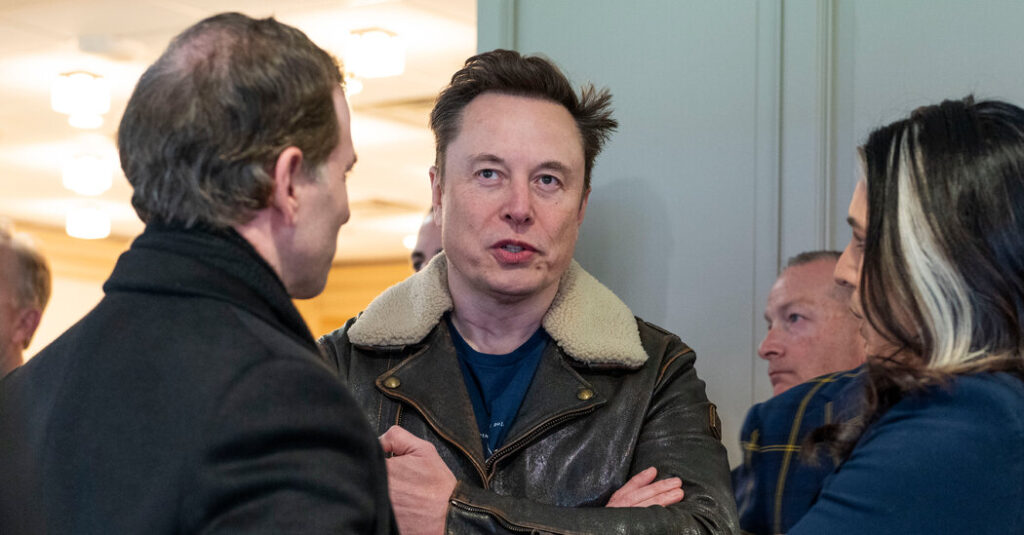As Elon Musk sweeps through the federal government, those close to the billionaire are touting one particular tool in their arsenal: artificial intelligence.
Mr. Musk, who leads a bevy of technology companies, including SpaceX, Tesla, X and xAI, has been tasked by the Trump administration with drastically reducing federal spending through the so-called Department of Government Efficiency, or DOGE. In the first two weeks of the administration, the group has upended federal agencies and urged workers to resign in order to reduce costs.
Musk allies who have taken on roles inside government agencies are evaluating how to harness A.I. to identify budget cuts and detect waste and abuse, according to people familiar with internal conversations, who spoke on the condition of anonymity out of fear of retaliation.
On Monday, Thomas Shedd, a former Tesla engineer who was appointed by the new administration to head technology efforts at the General Services Administration, told some staffers that A.I. would be a key part of their cost-reduction work, according to four people with knowledge of the conversation. At the agency, some staffers have been informed that they will be expected to cut 50 percent of its budget.
The agency houses the Technology Transformation Services, a group of roughly 700 technologists that Mr. Musk’s DOGE has seen as a key resource of engineering talent. Members of DOGE — who Mr. Shedd has referred to in internal messages as his “advisers” — have spent the past two weeks interviewing workers, asking them to describe their technical accomplishments and identify co-workers who exhibit “exceptional” talent.
Meeting with T.T.S. members Monday, Mr. Shedd said he hoped to pool all government contracts in a central database and use artificial intelligence to assess them for potential redundancies and budget reductions, the people familiar with the discussion said. He noted that the acting G.S.A. administrator, a Trump appointee and Salesforce executive named Stephen Ehikian, is maintaining an A.I. strategy document.
A.I. could also be used as a tool to detect fraud and waste, Mr. Shedd added.
Neither G.S.A. nor Mr. Shedd responded to requests for comment.
While both the Trump and Biden administrations have signaled an interest in increasing federal spending on the use of A.I. technologies across government, it’s unclear if the emerging technology could be used to identify overspending or fraud as Mr. Musk’s allies envision. In public discussions, Mr. Musk has, with little evidence, portrayed the U.S. government as rampant with billions of dollars in fraud that can be excised with hard work and technological know-how.
President Trump has defended Mr. Musk’s vast reach and the tactics he has used to shake up the federal bureaucracy.
“He’s got a team of very talented people, and we’re trying to shrink government, and he can probably shrink it as well as anybody else, if not better,” Mr. Trump told reporters on Monday.
Mr. Musk has been bullish on building A.I. systems at his companies, while simultaneously warning that the powerful technology could destroy humanity if he does not control it. Mr. Musk leads xAI, an artificial intelligence company that provides a chatbot and other services to his social media company, X, and also uses A.I. to power driver assistance systems at Tesla.
He has also sued OpenAI, his chief competitor, claiming that the firm, which he co-founded, breached its founding contract by putting commercial interests ahead of the public good. Mr. Musk left OpenAI in 2018 after disputes with other co-founders. (The New York Times has sued OpenAI and Microsoft, claiming copyright infringement of news content related to A.I. systems. The two companies have denied the suit’s claims.)
The leaders of the nation’s largest A.I. companies — among them Google, Meta, OpenAI and Amazon — donated to and attended Mr. Trump’s inauguration last month as they’ve sought to curry favor with a new administration shaping federal policy around the developing technology.
Mr. Trump also appointed David Sacks, a venture capitalist, donor and ally to Mr. Musk, as the “White House A.I. and Crypto Czar,” and rescinded the Biden administration’s order to create A.I. safeguards. Last month, the president also announced a new $100 billion A.I. initiative between OpenAI, Oracle and SoftBank to create computing infrastructure in the United States to power artificial intelligence.
In his new government role, Mr. Musk has insisted that there is ample waste and fraud that has gone undetected, echoing claims he made when he cut costs at companies like Twitter. In a livestream audio conversation that began after midnight on Monday in Washington, Mr. Musk claimed that wasteful spending, including “fake people” collecting Social Security and Medicare payments as well as “foreign fraud rings,” was taking $100 billion to $200 billion a year of U.S. taxpayer money.
“A trillion dollars can be saved just by addressing waste, fraud and abuse,” he said without saying how he arrived at that number.
Aric Toler contributed reporting.


